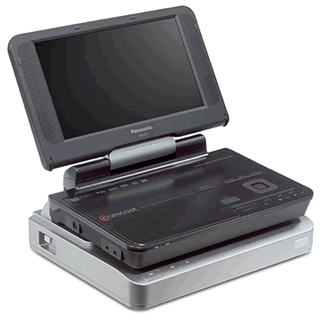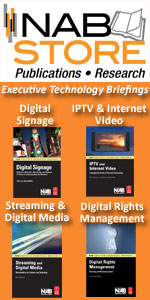| |
Tru2way™
Platform for Bidirectional Cable Communication
Launches
Comcast
Corporation and Panasonic have announced the first deployment
of tru2way bidirectional digital cable technology. Tru2way
was developed by CableLabs based on the OpenCable™ specification
and is a Java-based open application platform. It is being promoted
as a digital CableCARD™ system that enables two-way communication
between a digital-cable-ready TV set or other device and a cable
operator's head end to provide viewers with a rich interactive
experience. According to a statement from Panasonic, "the
technology creates a common software platform that will enable
cable companies, consumer electronics companies, content developers,
network programmers and others to extend interactivity to the
TV set and other kinds of devices."
 |
On October
15, 2008, Comcast activated the technology on its cable
systems in Chicago and Denver. Panasonic HDTV sets with
tru2way capability were also made available at selected
retail outlets in these areas. The new Panasonic 42"
and 50" Viera sets have built-in tru2way CableCARD
slots enabling consumers to receive the cable electronic
program guide and access two-way digital cable programming,
like video on demand, pay-per-view, and other services,
without a cable operator-supplied set-top box. To see the
announcement from Panasonic and Comcast click
here. Another announcement, from the Consumer Electronics
Association, is available here.
The
advantage of the bidirectional cable card for
consumers is that it removes he need for another set-top
device around the TV and potentially reduces the equipment
fee cable operators
|
| Screen
shot of interactive cable menu on Panasonic HDTV using tru2way
|
charge to lease
their set-top components. However, it also enables other DTV devices
to have bidirectional cable capability.
|
Comcast
will supply tru2way CableCARDS to subscribers who request
them and will provide Multistream cards, which enable tuning
up to two channels simultaneously for recording one while
watching a different program. While the initial tru2way
products rolled out by Panasonic in Chicago and Denver are
integrated televisions without recording capability, at
the Consumer Electronics Show (CES) in January this year,
Panasonic and Comcast announced that a tru2way set-top box
with DVR was undergoing trials and would be available later
in 2008. At CES, they also showed a tru2way-enabled portable
digital video recorder (P-DVR) known as the Comcast AnyPlay™,
expected to be available in 2009. This device incorporates
DVR functionality into a portable DVD player, which, when
placed in a docking station connected to cable, functions
as a full-featured DVR (for more details, click
here).
This
deployment of a bidirectional cable card system is the end
of a long-drawn-out process. In the Communications Act of
1996, Congress first sought to provide cable television
customers with the opportunity to purchase their own navigation
devices (i.e., set top boxes). This finally led to the FCC's
Plug and Play Order of
|
 |
|
Panasonic/Comcast
AnyPlay Portable DVR
|
September 2003
that provided consumers with the possibility for purchasing an alternative
to the set-top box rented from the cable company. However the adopted
specifications provided for a one-way system only, with no upstream
or bidirectional capabilities and no support for services such as
electronic program guides, video on demand, pay-per-view or other
interactive features.
As reported
in TV
TechCheck
of July 9, 2007, the cable industry and the consumer electronics
industries subsequently submitted different proposals for bidirectional
plug-and-play systems, neither of which gained acceptance. This
eventually led to the FCC in June 2007 releasing a Notice of
Proposed Rule Making, stating that consumers had not shown
significant interest in one-way services and soliciting comments
on the two different proposals for bidirectional cable solutions.
In reply comments to that NPRM, the National Cable and Telecommunications
Association (NCTA) set out the case for adopting the OpenCable™
platform developed by CableLabs (for the NCTA comments click
here).
The OpenCable
platform was subsequently renamed tru2way and announced at the
Consumer Electronics Show in January this year by Comcast and
several consumers electronics manufacturers as an agreed software
platform to enable digital televisions and other devices to access
cable's two-way interactive services without the need for a set-top
box. This was confirmed by binding memorandums of understanding
on tru2way technology signed in June 2008, between six U.S. cable
operators (Comcast, Time Warner, Cox, Cablevision, Charter, and
Bright House Networks) and consumer electronics manufacturers
including Panasonic, Samsung, Sony, and also with set-top box
makers ADB and Digeo, and chip manufacturer Intel.
While not
codified by the FCC, it does seem that tru2way will be the de
facto cable industry standard for interactive cable systems. Its
capabilities are summarized in the Host License agreement (click
here) and the full OpenCable specifications are available
at www.opencable.com/specifications.
Share
Your Expertise with Your Fellow Engineers
Last Call for 63rd NAB Broadcast Engineering Conference
Proposals
 The
NAB Show will host the 63rd NAB Broadcast Engineering Conference
(BEC) on April 18 - 23 at the Las Vegas Convention Center in Las
Vegas, Nev. This world-class conference addresses the most recent
developments in broadcast technology and focuses on the opportunities
and challenges that face broadcast engineering professionals around
the world. The BEC is a highly technical conference where presenters
deliver technical papers ranging over a variety of topics relevant
to the broadcast and allied industries. We invite you to submit
a proposal to present a technical paper at our conference. The
deadline for submitting your proposal is October 27, 2008. The
NAB Show will host the 63rd NAB Broadcast Engineering Conference
(BEC) on April 18 - 23 at the Las Vegas Convention Center in Las
Vegas, Nev. This world-class conference addresses the most recent
developments in broadcast technology and focuses on the opportunities
and challenges that face broadcast engineering professionals around
the world. The BEC is a highly technical conference where presenters
deliver technical papers ranging over a variety of topics relevant
to the broadcast and allied industries. We invite you to submit
a proposal to present a technical paper at our conference. The
deadline for submitting your proposal is October 27, 2008.
To submit
a technical paper proposal, click
here and complete the electronic form. If you have questions
regarding the NAB Broadcast Engineering Conference, please contact
John Marino.

The
October 27, 2008 TV TechCheck is also available
in an Adobe Acrobat file.
Please click
here to read the Adobe Acrobat version of TV TechCheck.
|
|

